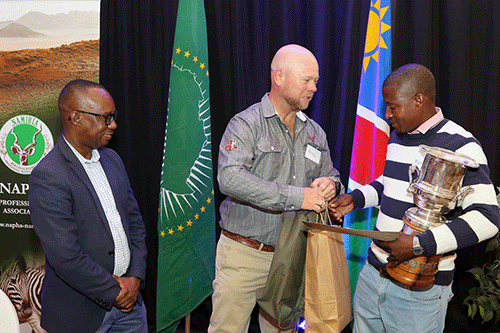Every other day, Max Muyemburuko plies the bumpy roads to remote areas in north-eastern Namibia to engage local communities in protecting wildlife.
The 39-year-old conservationist with the Community-Based Natural Resources Management (CBNRM) programme trains community members on the impact of crucial legislation on the environment,
and the Integrated Forest and
Wildlife Management Plan for 17 community-based organisations.
Namibia has 86 conservancies covering 166 179 square kilometres and benefitting 233 100 local people.
“It is important to educate the communities, highlighting economic benefits to local communities in protecting the environment,” Muyemburuko said.
Since taking up the role in 2006, he has convened nearly 200 community meetings.
His work which needs him to grapple with more than just navigating rough terrain, has paid off.
“We observed a mindset shift among locals in the area towards the environment. The aim is to inspire change in how locals treat the environment,” Muyemburuko observed.
When not convening community meetings on environmental protection in conservation areas, he would be on patrol to curb wildlife crimes such as the poaching of pangolins and rhinos.
Figures from the Ministry of Environment, Forestry and Tourism show that 87 rhinos were poached in 2022, up from 45 in 2021, 43 in 2020, and 61 in 2019.
Muyemburuko, troubled by the destruction of natural habitats and the consequent loss of wildlife, wants to make a difference.
“Quite a handy role, but key to addressing challenges” such as poaching and extractive industries, he said. “And this is voluntary work.”
He grew up in the Livayi and Shamambungu villages in Namibia’s Kavango East region, and joined the conservation programme when he was 22.
Today, his passion for nature is the mainstay of his work.
“Conservation is in my blood from birth. Listening to birds’ tweets, I learned early to appreciate the importance of protecting biodiversity, hence choosing this field,” Muyemburuko said.
His and his colleagues’ efforts have not only led to the protection of endangered species, but also helped to promote sustainable tourism in the country, said Romeo Muyunda, spokesperson for the Ministry of Environment, Forestry and Tourism (MEFT).
In 2022, Muyemburuko won the Conservationist Award of the Year from the Directorate of Wildlife and Parks Management in the MEFT.
Holder of a travel and tourism management diploma, he is pursuing a degree in tourism management to help create sustainable solutions to preserve Namibia’s unique biodiversity.
“The plan is still to put more efforts into conservation activities for a healthier environment,” he noted.
-Nampa/Xinhua


